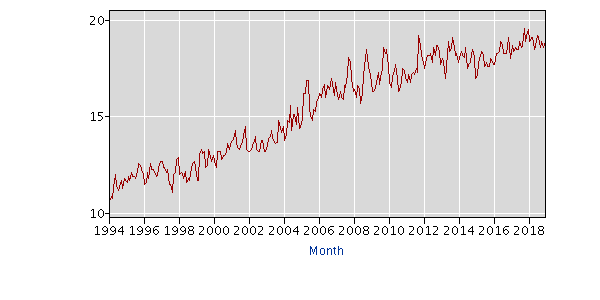January 28, 2019
David Leonhardt used his column to give us a story about how the millennials are the big losers and the oldsters are the big winners in today’s economy. The piece shows trends in the growth of income and wealth which show the over 65 group doing very well and everyone else not. This is not a quite a simple granny-basher column, Leonhardt does come around at the end and tells readers:
“But the country’s biggest economic problems aren’t about hordes of greedy old people profiting off the young. They’re about an economy that showers much of its bounty on the already affluent, at the expense of most Americans — and of our future. The young pay the biggest price for these inequities.”
Nonetheless, there are a couple of points that are misleading and need some qualification.
First, when it comes to the median income of people over age 65, it is important to note that this is much more likely to reflect the income of a household with at least one worker than would have been the case a quarter century earlier. The percentage of people between the ages of 65 to 69 who are working rose from 21.0 percent in 1994 to 31.9 percent in 2018. For people between the ages of 70 to 74 it rose from 11.3 percent to 18.9 percent.
Employment to Population Ratio 70–74 Years

Source: Bureau of Labor Statistics.
This increase in employment among older workers is not all negative. In many cases, it is due to the fact that older people are more likely to be in good health and to be working at jobs they enjoy. But in many cases, these are people who are working because they have no other way to make ends meet. In these cases, it is not an apples-to-apples comparison to say that the income of an older worker in 2018 is higher than a non-working retiree 25 years earlier.
The measure of wealth is also problematic since it does not include traditional defined benefit (DB) pensions. Thirty years ago, a retiree was more likely to have a DB pension than today. DB pensions have been partially replaced by 401(k)s, which are counted as wealth. This means that even if there is no increase in living standards or security, seniors will report as having more wealth today than in the past.
The other issue is Leonhardt’s use of government debt as a measure of future burdens. This is just sloppy and serious people should stop doing it. Direct spending is one way that the government pays for services. Another way is by granting patent and copyright monopolies. These monopolies now lead to rents that total many hundreds of billions annually, perhaps more than $1 trillion. This is an amount that is far larger than the burden of interest on the debt.
It makes zero sense to count the government debt as a burden to be paid by future generations (to other members of future generations), but to ignore the much larger burden created by patent and copyright monopolies. If folks want to say the debt is hurting our children, they should point out that patents to drug companies and copyrights to software companies have the same effect, at least if the point is an honest discussion of the economic issues involved.







Comments